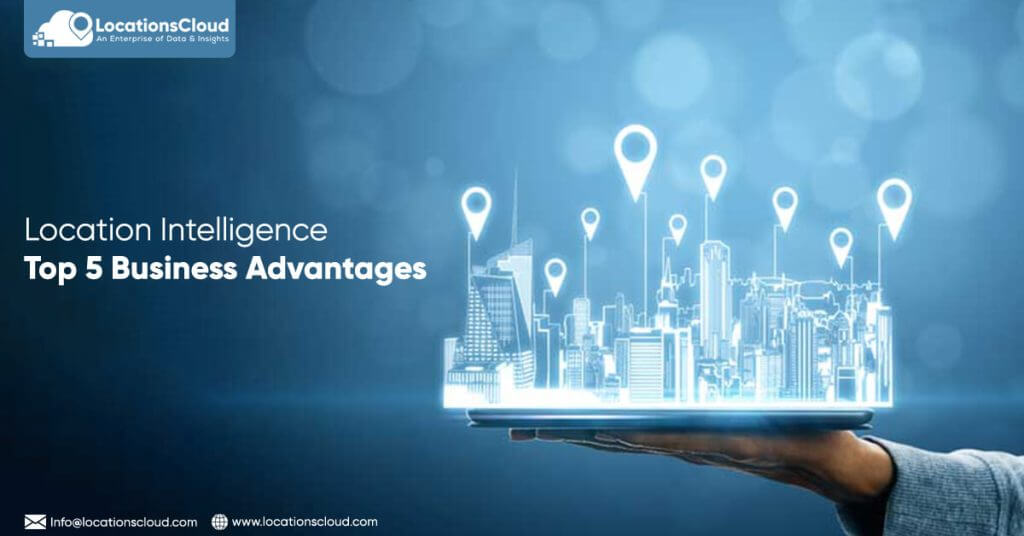
It is no secret that the world is changing. The pace of change is faster than ever before, and businesses are starting to feel the effects. So, to keep up with the competition, businesses must adopt new technology. One of the best ways to do that is location intelligence (LI).
Location intelligence is a business analysis tool that collects, analyzes, and applies location-based information to improve business processes. The best way to understand this is by taking an example of a retail store. If you run a retail store, you want to know where your customers are coming from. Which areas are they visiting more often? How many customers visit your store daily?
These questions can be answered by using location intelligence. These are not the only benefits that LI has; there are more. So, let’s talk about the top five business advantages of location intelligence.
What Is Location Intelligence?
Location intelligence is the use of data, analytics, and technology to understand where people are, what they are doing, and why they are doing it.
It is the set of tools and technologies that allow businesses to make better decisions thanks to insights into their customers’ behavior. Location intelligence can help companies understand how customers move through their stores, what products they buy at what times, and where they go after leaving the store
Retailers like Amazon or Target use location intelligence to decide where to locate new stores or which products should be stocked in each location. Hotels use it to determine where to place restaurants or fitness centers for maximum customer traffic. And hospitals use it to ensure patients have easy access to emergency rooms and pharmacies.
Some Common Industries Use Location Intelligence
Location intelligence is a powerful tool for businesses. It can be used to improve sales, improve customer services and increase profits by using data in new ways. Here are some common industries that use location intelligence:
Retail:
Retailers use location intelligence better to understand their customer’s shopping habits and preferences. They also use it to optimize the layout of their stores and better design their product displays.
Restaurants:
Restaurants use location intelligence to understand where their customers are coming from and how long they stay at each restaurant. This allows them to make informed decisions about how many tables they need, what food they should serve, and more.
Real Estate:
Real estate agents use location intelligence to inform clients about nearby homes for sale or rent. When someone wants to buy or rent a home, an agent can bring up information about homes within a certain distance from their current location or search for homes based on features like schools or grocery stores nearby.
Construction & Home Improvement:
Construction companies use location intelligence when building new structures. They can measure distances between houses or other buildings on site to know where utilities should go before digging holes in the ground or drilling through walls.
Top Location Intelligence Use Cases
Location intelligence is a powerful tool for businesses. It can transform companies’ operations, from sales to logistics, marketing, and customer service. But where should you start? Location intelligence is a big topic, so knowing where to begin is hard. The good news is that there are many ways to use location intelligence in your business. Here are five common use cases:
1.Market analysis
Location intelligence tools can be used to analyze market data based on location. This is especially helpful for companies that must compare their sales figures with those of competitors in the same region.
2.Customer Services
Customer service is one of the many use cases for location intelligence. With access to your customer’s locations, you can provide them with better customer service by knowing their exact location in case of emergency or if they need assistance.
Suppose you have an extensive network of stores and other business locations. In that case, you can also use location data to improve your customer service by knowing where they are currently based on their location history and preferences.
3.Fleet Routing And Management
Fleet management is one of the most common use cases for location intelligence. Companies must track their vehicles in real-time to ensure they drive safely and on schedule. With GPS tracking, companies can also analyze their drivers’ routes and speeds to improve efficiency and reduce costs.
4.Asset Tracking
Assets such as tools, equipment, and vehicles must be tracked to be returned at the end of an employee’s shift or when they finish their work day. Using GPS tracking devices, companies can keep tabs on these assets without manually checking if they have been returned.
5.Field Sales Management
Sales teams are the backbone of any organization and must be managed effectively to meet business goals. There are multiple ways to manage sales teams, but a location intelligence tool can help you improve the performance by providing insights on where and when your sales reps spend their time, what kind of results they are getting, which accounts they should focus more on, and so on.
Business Advantages of Embracing Location Intelligence
The demand for location intelligence is at an all-time high. The benefits of using location intelligence are plentiful, ranging from increased customer engagement and foot traffic to improved operational efficiency.
Here are seven business advantages of embracing location intelligence:
1. Identify High-Value Customers
If you know where your most profitable customers are, you can focus on attracting more like them. For example, if you know that iPhone users spend more than Android users on your app, then you know that it makes sense to invest in developing an iOS version of your app.
2. Provide Better Customer Services
The first and most apparent benefit of location intelligence is that it enables businesses to provide better customer service. You can find the nearest available supplies at the local hardware store or by getting a taxi home after a night out with friends.
3. Advertising & Marketing
Marketing campaigns can be more effective when they include location data. For example, a retail store could use location intelligence to send personalized coupons or messages to customers based on their purchases or browsing history.
In addition, if you want to target specific geographic areas with an ad campaign, you can use location intelligence to determine which locations will likely give you the most return on investment (ROI). This can help ensure your budget is well-spent on ads that don’t convert well.
4. Optimize Marketing Strategy
Location intelligence solutions allow you to target your audience with the right message at the right time. This makes your marketing efforts more effective and results in higher ROI.
You get data-driven insights into how customers interact with your products and services, allowing you to personalize their experience based on what they need at any time. With this information, you can tailor your marketing messages and offers to meet their needs and drive them back into stores or online portals for more purchases.
5. Find New Opportunities
Businesses can use location intelligence to find new opportunities. For example, a retailer can know the most popular products in certain areas. This information can be used to decide where to open new stores or what products to stock in each one. Similarly, a bank might want to know where its customers are most likely to be found so it can offer more services in those locations.
Wrapping Up
Many companies are entering the location-intelligence space today. Big Data is one of the key areas where these companies can gain a competitive advantage. Location intelligence will help companies obtain valuable insights. These insights can grow revenue, reduce costs and increase profits. The future looks bright for the location-intelligence market as it is one of the fastest growing in the big data realm.


